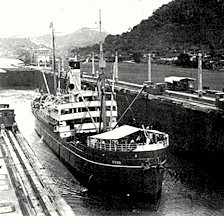SS Cuba (1920) facts for kids
class="infobox " style="float: right; clear: right; width: 315px; border-spacing: 2px; text-align: left; font-size: 90%;"
| colspan="2" style="text-align: center; font-size: 90%; line-height: 1.5em;" | 
| History | |
|---|---|
| Name | SS Coblenz |
| Namesake | Koblenz |
| Owner | North German Lloyd |
| Builder |
|
| Yard number | 215771 |
| Launched | 18 March 1897 |
| Acquired | 5 May 1897 |
| Out of service | 1917 |
| Captured |
|
| Name | SS Sachem |
| Owner | United States Shipping Board |
| In service | 1917 |
| Out of service | 1920 |
| Fate | Sold, 1920 |
| Name | SS Cuba |
| Namesake | Cuba |
| Owner | Pacific Mail Steamship Company |
| Cost | $400,000 |
| Acquired | 2 February 1920 |
| In service | 1920 |
| Out of service | 1923 |
| Fate | Wrecked 7 September 1923 |
| General characteristics | |
| Tonnage | 3169 |
| Length | 93.78 m (307 ft 8 in) |
| Beam | 12.86 m (42 ft 2 in) |
| Depth of hold | 7.5 m (24 ft 7 in) |
| Decks | 2 |
| Propulsion | 2 Triple expansion steam engines, twin screws, 1,500 hp (1,100 kW) |
| Speed | 11.5 knots (21.3 km/h; 13.2 mph) |
| Capacity | ;as SS Coblenz:
|
| Crew | ;as SS Coblenz:
|
|} The Cuba was a large steamship that sailed the seas many years ago. It had a long history and several names. It started its life in Germany, then became an American ship, and finally sailed for the Pacific Mail Steamship Company.
Contents
A Ship with Many Names
The ship was first launched in 1897 in Germany. Its original name was SS Coblenz. It was owned by a German company called North German Lloyd.
From Germany to America
During World War I, the United States took control of the ship in 1917. At this time, its name was changed to SS Sachem.
Becoming the Cuba
In 1920, the Pacific Mail Steamship Company bought the ship. They paid $400,000 for it. The ship was then renamed SS Cuba.
Journeys of the Cuba
The Cuba carried both people and goods across the ocean. It had different routes during its time with Pacific Mail.
Early Routes
At first, the Cuba sailed between San Francisco, California, and Havana, Cuba. This route connected the west coast of the United States with the Caribbean.
Panama Canal Route
Later, the ship's route changed. It began sailing from San Francisco to Cristóbal, Panama. This port is at the Atlantic entrance of the Panama Canal.
The Final Voyage
The Cuba's last journey ended in a shipwreck. This happened on September 8, 1923.
Striking a Reef
The ship hit a hidden reef near San Miguel Island in California. This area is known as the Santa Barbara Channel. The ship was traveling through a very thick fog. Its radio was not working, so it could not get help or warnings.
Rescue and Loss
Even though the ship was badly damaged, everyone on board survived. They were all rescued safely. However, the Cuba itself was completely lost.
Nearby Disaster
On the same day, not far from where the Cuba wrecked, nine U.S. Navy destroyers also ran aground. This separate event is known as the Honda Point disaster.
Where the Wreck Lies
The remains of the Cuba can still be found today. The wreck is located in the ocean near Point Arguello. You can find it at these coordinates: 34°01′55″N 120°27′14″W / 34.032°N 120.454°W.
 | James B. Knighten |
 | Azellia White |
 | Willa Brown |

